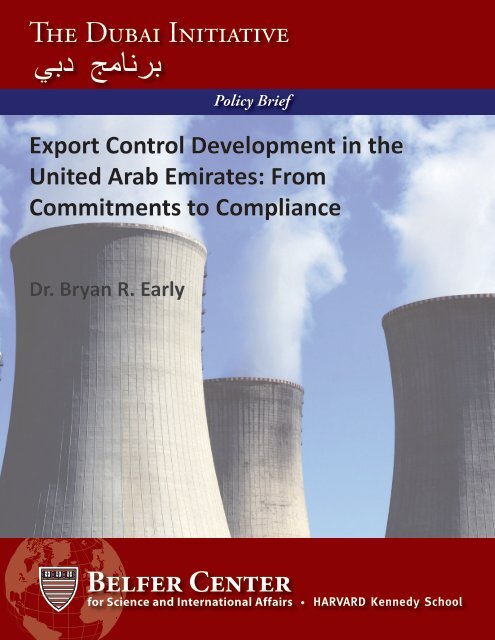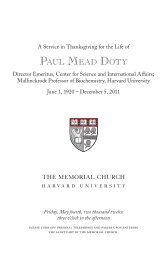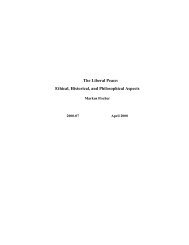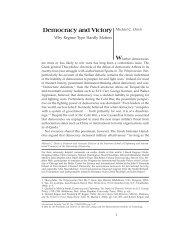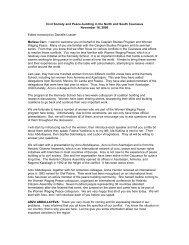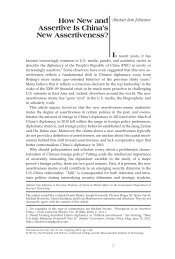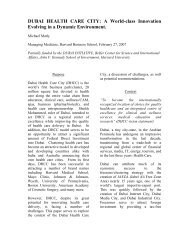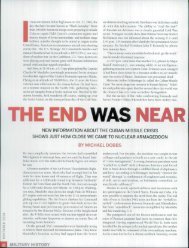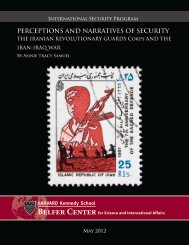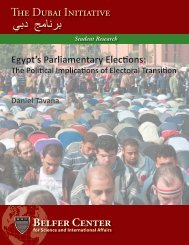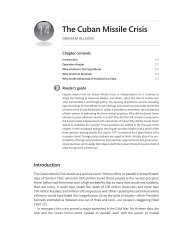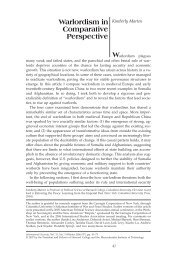ExPoRT ConTRol DEvEloPmEnT In THE UnITED ARAB ... - CILT UAE
ExPoRT ConTRol DEvEloPmEnT In THE UnITED ARAB ... - CILT UAE
ExPoRT ConTRol DEvEloPmEnT In THE UnITED ARAB ... - CILT UAE
Create successful ePaper yourself
Turn your PDF publications into a flip-book with our unique Google optimized e-Paper software.
The Dubai <strong>In</strong>itiative<br />
Export Control Development in the<br />
United Arab Emirates: From<br />
Commitments to Compliance<br />
Dr. Bryan R. Early<br />
Policy Brief
Export Control Development in the United Arab<br />
Emirates: From Commitments to Compliance<br />
Dubai <strong>In</strong>itiative – Policy Brief<br />
Dr. Bryan R. Early<br />
Research Fellow, The Dubai <strong>In</strong>itiative<br />
Better Center for Science and <strong>In</strong>ternational Affairs<br />
Harvard University<br />
July 6, 2009
<strong>In</strong>troduction<br />
<strong>ExPoRT</strong> <strong>ConTRol</strong> <strong>DEvEloPmEnT</strong> <strong>In</strong> <strong>THE</strong> <strong>UnITED</strong> <strong>ARAB</strong> EmIRATES | 1<br />
The swiftness with which the United Arab Emirates (<strong>UAE</strong>) has launched<br />
its civil nuclear program presents a number of challenges for policymakers in seeking<br />
to ensure the program’s safety and security. At the onset of its efforts, the <strong>UAE</strong><br />
government consulted with a set of the world’s leading nuclear suppliers to develop<br />
a framework that would help its nuclear program conform to the highest standards<br />
in terms of safety, security, and nonproliferation. The <strong>UAE</strong> drew on these consultations<br />
in making a sweeping set of international commitments in April 2008<br />
to ensure that the sensitive nuclear materials and technologies it would acquire as<br />
part of its nuclear program would be securely controlled. 1 While the <strong>UAE</strong> has been<br />
widely praised for the depth and breadth of the nonproliferation commitments it<br />
has made, it will be the <strong>UAE</strong>’s efficacy at complying with them by which its success<br />
will be judged.<br />
The largest commitment-compliance gap for the <strong>UAE</strong> government potentially<br />
relates to its system of nonproliferation export controls. Export controls<br />
are national restrictions that governments place upon their constituencies’ exports<br />
of sensitive goods and technologies, which generally include arms and dual-use<br />
goods that can contribute to WMD programs. 2 Up until the fall of 2007, the <strong>UAE</strong><br />
did not possess a comprehensive export control law at the federal level—let alone<br />
an institutional framework capable of administering it. 3 This allowed the country<br />
to be exploited by the A.Q. Khan proliferation network as a nexus for its illicit proliferation<br />
activities. As well, Iran has for decades employed front companies and<br />
middlemen in the <strong>UAE</strong> to help it obtain sensitive goods and technologies that U.S.<br />
and international sanctions have prevented it from directly acquiring. 4 While the<br />
<strong>UAE</strong>’s recent nonproliferation commitments strongly signaled to the international<br />
community that it is prepared to adopt more stringent export controls, progress in<br />
this area has lagged behind its enthusiasm in moving forward with its planned civil<br />
nuclear energy program.<br />
This policy brief examines what the <strong>UAE</strong> government will need to do to<br />
fulfill its international commitments to construct an effective export control system.<br />
The first section discusses what an effective export control system entails and<br />
what the <strong>UAE</strong> would need to have in place to live up to the “gold standard” it has<br />
set for itself. Next, I assess the extent to which the <strong>UAE</strong> meets the criteria of an<br />
effective export control system. The following section provides a series of recommendations<br />
concerning the steps that could be taken to further foster the development<br />
of its system of export controls. The conclusion discusses the potential positive<br />
spillover that developing its export control system could have for the country.<br />
1 See: <strong>UAE</strong>, 2008.<br />
2 For good introduction to export controls and the international obligations that exist to impose them, see: Beck and<br />
Gahlaut, 2003: 1-22; Fuhrmann 2007.<br />
3 For a discussion of the rationale behind the <strong>UAE</strong>’s decision to impose export controls, see: McGovern, 2009.<br />
4 See Corera (2006) for an in-depth discussion of how the Khan network employed the <strong>UAE</strong> in its illicit proliferation activities.<br />
Milhollin and Motz (2004) and Swibel (2004) provide brief overviews of past illicit proliferant trade connections<br />
between the <strong>UAE</strong> and Iran.<br />
While the <strong>UAE</strong>’s<br />
recent nonproliferation<br />
commitments<br />
strongly signaled<br />
to the international<br />
community that it is<br />
prepared to adopt<br />
more stringent<br />
export controls,<br />
progress in this area<br />
has lagged behind its<br />
enthusiasm in moving<br />
forward with its<br />
planned civil nuclear<br />
energy program.
2 | DUBAI <strong>In</strong>ITIATIvE – PolICY BRIEF<br />
Committing to the “Gold Standard” of Export Controls<br />
<strong>In</strong> moving ahead with its nuclear program, the <strong>UAE</strong> government has aspired<br />
to establish the “global gold standard for peaceful nuclear energy development.” 5<br />
Abdullah bin Zayed Al Nahyan, the <strong>UAE</strong>’s Foreign Minister, has stated that his<br />
government seeks to develop “a model for the deployment of nuclear energy that<br />
is based on the highest standards of operational transparency, safety, security, and<br />
nonproliferation, as well as the principles of long-term sustainability and cooperation<br />
with the IAEA and responsible nuclear supplier states.” 6 Thus, the <strong>UAE</strong> has<br />
committed itself not only to meeting the minimal obligations to impose export controls<br />
by international law, but to meeting them at the most exacting of standards.<br />
The <strong>UAE</strong>’s obligations to impose an effective export control system stem<br />
from a series of United Nations Security Council (UNSC) mandates and voluntary<br />
commitments that it has made in its bid to attract foreign assistance for its nuclear<br />
program. <strong>In</strong> 2004, the UNSC passed Resolution 1540 that created a universal obligation<br />
for all states to impose effective export controls, 7 and, in 2008, the UNSC<br />
imposed sanctions that prohibited countries from trading sensitive nuclear materials<br />
and equipment with Iran. Importantly, the latter mandate requires an effective<br />
system of national export controls to implement. The <strong>UAE</strong> government further<br />
committed itself to becoming an adherent to the Nuclear Suppliers Group’s (NSG)<br />
Export Guidelines in April 2008 as part of its proposed plan for acquiring nuclear<br />
energy. 8 The NSG’s Export Guidelines constitute the leading consensus-based<br />
standards for ensuring that the export of nuclear materials and technologies does<br />
not contribute to the proliferation of nuclear weapons.<br />
The development of a country’s export control system can be evaluated in<br />
terms of three different dimensions: the legal foundations upon which it is based,<br />
the degree to which it has been effectively institutionalized, and how rigorously it<br />
is implemented. 9 The legal development of a country’s export control systems can<br />
be assessed in terms of how comprehensive a country’s export control laws are in<br />
terms of what commodities they restrict, the types of transactions they restrict, the<br />
authorities they establish and/or empower to monitor, regulate, and enforce the<br />
restrictions, and the legal framework they provide for the punishment of those who<br />
violate the restrictions. The institutional development of a country’s export control<br />
system relates to the degree to which the system has been bureaucratized. A country<br />
must have institutions devoted to monitoring and regulating the international<br />
trade that passes through its borders, institutions that will evaluate and issue permissions<br />
to trade in restricted goods, and institutions capable of enforcing violations<br />
of its export laws. Beyond having the requisite laws and institutions in place,<br />
a country must effectively implement its export controls. It must consistently and<br />
comprehensively regulate the trade that occurs in the goods it has restricted, preventing<br />
illicit transactions, granting licenses for and regulating legitimate business,<br />
as well as identifying and punishing violators of its laws.<br />
5 Embassy of the <strong>UAE</strong> in Washington, DC, 2009.<br />
6 Bin Zayed Al Nahyan, 2008.<br />
7 For more on UNSCR 1540, see: Fuhrmann, 2007; Bergenäs, 2008.<br />
8 The NSG is a multilateral export control regime constituted of the world’s leader suppliers of nuclear technology. For the<br />
<strong>UAE</strong>’s commitment to adopt the NSG’s Export Guidelines, see: <strong>UAE</strong>, 2008: 4.<br />
9 For more on this three-part approach for evaluating the development of countries’ export control systems, see: Stinnett<br />
et al., 2009. More detailed rubrics for evaluating export control development can also be found in: Bertsch and Grillot,<br />
1998; Beck et al., 2003; Fuhrmann 2007.
<strong>ExPoRT</strong> <strong>ConTRol</strong> <strong>DEvEloPmEnT</strong> <strong>In</strong> <strong>THE</strong> <strong>UnITED</strong> <strong>ARAB</strong> EmIRATES | 3<br />
Close, cooperative relationships between governments and their commercial<br />
sectors are essential components of well-functioning export control systems.<br />
Governments need to publicize and explain their export control laws to their commercial<br />
sectors, their agencies must coordinate their regulatory processes with the<br />
firms and industries they govern, and the implementation of export controls must<br />
be fair, transparent, and efficient to convince private sector firms to buy into their<br />
government’s controls. <strong>In</strong> the most well-developed export control systems, institutionalized<br />
self-policing by private sector firms occurs in tandem with government<br />
regulation. 10<br />
Constructing a well-functioning export control system also requires a significant<br />
degree of technical expertise and tacit knowledge in its design and in the<br />
training of the officials that administer it. For example, a country’s customs agents<br />
at its ports must be able to recognize and differentiate between sensitive dual-use<br />
goods that are subject to restrictions and those goods that can be freely traded. As<br />
well, the licensing officials responsible for approving transactions involving restricted<br />
goods must be able to evaluate the proliferation risks posed by a particular<br />
good and its claimed end-users in Country X. <strong>In</strong>deed, many countries have required<br />
extensive external assistance in building their export controls systems (e.g.,<br />
Poland, Estonia, and Armenia). Previous examples suggest the process of developing<br />
the indigenous expertise to effectively manage an export control system can<br />
take upwards of a decade. Obtaining a “gold standard” export control system is<br />
a time- and resource-intensive undertaking, one that cannot be purchased outright<br />
nor put into place and then forgotten about.<br />
The Ongoing Development of the <strong>UAE</strong>’s Export Control System<br />
The <strong>UAE</strong> government’s prominent challenge in constructing an effective<br />
national export control system that keeps pace with the development of its civilian<br />
nuclear program relates to its confederated political structure and the relatively<br />
recent initiation of its efforts. Under the <strong>UAE</strong>’s confederal structure, each of the<br />
government’s seven emirates retained the authority to operate their own individual<br />
customs authorities. <strong>In</strong>deed, it was not until 2003 that the <strong>UAE</strong>’s national government<br />
even created the Federal Customs Authority. The <strong>UAE</strong>’s decentralized<br />
system for governing its international trade presents a number of coordination and<br />
implementation challenges for the federal government in creating a comprehensive<br />
national export control system. Furthermore, the <strong>UAE</strong> government only recently<br />
initiated its efforts to put an export control system into place. The <strong>UAE</strong>’s first<br />
comprehensive law on nonproliferation export controls only went on the books in<br />
September 2007. Though the content of the new law is promising, neither its institutionalization<br />
nor its implementation will occur overnight. The rest of this section<br />
provides an overview of the current development of the <strong>UAE</strong>’s export control<br />
system in terms of its legal foundations, institutionalization, and implementation,<br />
in addition to discussing the issue of government outreach.<br />
The <strong>UAE</strong>’s Federal Law No. 13 of 2007 establishes a comprehensive set<br />
of controls governing the export, re-export, transit, and transshipment of dualuse<br />
goods through its territories. 11 The law also explicitly extends to the <strong>UAE</strong>’s<br />
10 For a more detailed introduction to the components of effective export control systems, see: Beck and Gahlaut, 2003:<br />
1-22.<br />
11 The text of the <strong>UAE</strong>’s Federal Law No. 13 of 2007, as amended by Federal Decree No. 12 of 2008 is available in Arabic<br />
The <strong>UAE</strong> government’s<br />
prominent challenge<br />
in constructing an effective<br />
national export<br />
control system that<br />
keeps pace with the<br />
development of its<br />
civilian nuclear<br />
program relates to its<br />
confederated political<br />
structure and the<br />
relatively recent<br />
initiation of its efforts.
4 | DUBAI <strong>In</strong>ITIATIvE – PolICY BRIEF<br />
free trade zones (e.g., JAFZA) and covers the brokerage of transactions involving<br />
restricted dual-use goods. The export control law also addresses the export of intangible<br />
goods, like software and blueprints, which will protect sensitive technologies<br />
from being proliferated. Additionally, the law contains a “catch-all” clause<br />
that provides Emirati authorities with broad discretion in preventing transactions<br />
that may contribute to proliferation. Violations of the law carry both administrative<br />
and criminal punishments, which include stiff fines and jail time. The export<br />
control law passed by the Emirati government provides a broad but technically<br />
nuanced foundation for the country’s export control system. It also mandates that<br />
emirate-level authorities must work with federal ministries in enforcing the law. By<br />
explicitly extending the law to the country’s free zones and including the brokerage<br />
of transactions involving restricted goods, the export control law specifically addresses<br />
vulnerabilities that proliferators had exploited in the past. While Federal<br />
Law No. 13 and follow-up legislation in 2008 provided the broad foundations for<br />
an export control system, they left the development of many practical regulations<br />
concerning the laws’ institutionalization and implementation to a high-level committee<br />
that would subsequently be formed.<br />
<strong>In</strong> February 2009, the <strong>UAE</strong>’s Council of Ministers established the Commission<br />
on Commodities Subject to Import and Export Controls. The Commission<br />
is composed of officials from a host of federal ministries with a stake in the export<br />
control issues, and headed by a minister of state for foreign affairs. This commission<br />
met for the first time on May 11, 2009. 12 Given the breadth of the responsibilities<br />
charged to the commission for the institutionalization of the country’s export<br />
controls, including the development of the licensing system that will be used to<br />
regulate trade in the items restricted by the export control law, little progress can<br />
be expected in the brief period that the commission has existed. So while the<br />
commission’s formation signals that the <strong>UAE</strong> government is moving forward with<br />
the process of institutionalizing its export control system, the development of a<br />
coherent set of standardized rules and procedures for operationally managing the<br />
country’s export control system remains a work-in-progress. And while the commission<br />
contains representatives from a number of ministries that could potentially<br />
be involved in the administration of the country’s export control system, no clear<br />
framework of institutionally delineated responsibilities between them appears to<br />
exist nor does a plan for coordinating with emirate-level authorities, which will be<br />
conducting much of the on-the-ground enforcement of the controls. 13<br />
Developing an efficient and ultimately effective model for coordinating<br />
between the various stakeholder institutions at the federal and emirate levels poses<br />
one of the commission’s greatest challenges. Beyond this task, the commission<br />
will then face the challenge of creating the institutional and individual competencies<br />
across the various levels of the country’s export control system that will<br />
provide those charged with administering the country’s export control laws with<br />
the capacity to do so. This suggests that the <strong>UAE</strong> will have to undertake a massive<br />
training effort that will extend across the multitude of federal agencies involved in<br />
the administration of export controls and across all seven of its emirates.<br />
at the <strong>UAE</strong> Ministry of Justice’s website at: http://www.elaws.gov.ae/EnLegislations.aspx. The analysis of the law relies<br />
upon an unofficial but vetted English translation of the law obtained by the author.<br />
12 “<strong>UAE</strong> Enhances Federal Export Law,” 2009.<br />
13 “<strong>UAE</strong> Enhances Federal Export Law,” 2009.
<strong>ExPoRT</strong> <strong>ConTRol</strong> <strong>DEvEloPmEnT</strong> <strong>In</strong> <strong>THE</strong> <strong>UnITED</strong> <strong>ARAB</strong> EmIRATES | 5<br />
Though the <strong>UAE</strong> government claims to taken a number of actions taken<br />
to curb proliferant trade since 2007, these enforcements appear to have occurred<br />
on an ad hoc basis rather than as an extension of a fully operational export control<br />
system. According to the Wall Street Journal, Emirati officials assert that<br />
they have shut down 40 Iranian companies operating out of Dubai that were engaging<br />
in trade that violated their export control laws and blocked more than 10<br />
proliferation-sensitive transfers to Iran. 14 More generally, it appears as if Dubai<br />
has also undertaken the greatest efforts to train its frontline officials (e.g., customs<br />
officials) in the identification and handling of proliferation-sensitive goods. 15<br />
Such enforcement efforts illustrate the Emirati government’s willingness to shut<br />
down proliferant trade when it receives actionable information about such activities<br />
occurring within its borders. <strong>In</strong>deed, a number of the enforcement activities<br />
undertaken by the <strong>UAE</strong> government relied upon intelligence and information from<br />
foreign governments, with which it has established cooperative relationships on<br />
these issues. 16 Yet, the ad hoc enforcement of export control violations constitutes<br />
only a small step towards the ultimate goal of a standardized system of controls<br />
capable of regulating all trade in proliferation-sensitive goods. <strong>In</strong>deed, the deputy<br />
director of the <strong>UAE</strong>’s Federal Customs Authority expressed frustration in the fall<br />
of 2008 over the fact that the <strong>UAE</strong> did not have the expertise to identify the dualuse<br />
goods that it was mandated to restrict by virtue of UNSCR 1803. 17 The lack<br />
of institutionalized systems for licensing controlled exports and coordinating their<br />
enforcement will limit the Emirati government to punishing the symptoms of lax<br />
controls rather than addressing their fundamental cause. If the <strong>UAE</strong> aspires to a<br />
“gold standard” system of export controls, it must propagate a culture amongst its<br />
commercial constituencies aimed at preventing rather than just punishing violations.<br />
<strong>In</strong> this regard, one of the areas in the most dramatic need of improvement<br />
relates to the <strong>UAE</strong>’s lack of outreach to the commercial sectors its export controls<br />
are supposed to regulate. To date, the Emirati government has done little to publicize<br />
the export controls it has put into place. English translations of the <strong>UAE</strong>’s<br />
export control laws and control lists are not publically available via the federal<br />
government’s electronic resources or emirate-level customs agencies. 18 As well,<br />
the <strong>UAE</strong> appears to have few resources devoted to educating its commercial sectors<br />
about what complying with its export control laws would entail. Lastly, there<br />
is little transparency about the enforcement actions undertaken by the <strong>UAE</strong> government.<br />
The Emirati government has not publicized the identities of the parties<br />
that violated its export control laws and what punishments they received. <strong>In</strong> the<br />
United States, for example, “naming and shaming” is viewed as a valuable strategy<br />
in deterring companies from violating export control regulations. 19 Firms’ compliance<br />
with the <strong>UAE</strong>’s export controls is apt to be low until the following conditions<br />
14 Solomon and Cocker, 2009.<br />
15 McClenaghan, 2008a.<br />
16 This insight was provided in a number of interviews conducted by the author in the <strong>UAE</strong> in May of 2009. This point was<br />
also publicly made by the Deputy Director of the <strong>UAE</strong>’s Federal Customs Agency Saeed Khalifa Saeed al Marri. See:<br />
McClenaghan, 2009b.<br />
17 McClenaghan, 2009b.<br />
18 Dubai Customs comes the closest to providing these resources, but even the information contained its Partner’s Guide:<br />
The Guide to Safe Export pamphlet provides little in the way of specifics regarding the <strong>UAE</strong>’s actual controls. See Dubai<br />
Customs (2008).<br />
19 For an example of the U.S. Government’s naming-and-shaming strategy of improving export control compliance, see the<br />
U.S. Department of Commerce’s Don’t Let this Happen to You! publication (U.S. BIS, 2008).<br />
The lack of institutionalized<br />
systems<br />
for licensing controlled<br />
exports and<br />
coordinating their<br />
enforcement will<br />
limit the Emirati government<br />
to punishing<br />
the symptoms of<br />
lax controls rather<br />
than addressing their<br />
fundamental cause.
6 | DUBAI <strong>In</strong>ITIATIvE – PolICY BRIEF<br />
are met: 1) they are aware of and understand the <strong>UAE</strong>’s system of export controls;<br />
2) they know exactly what is required of them to comply with the <strong>UAE</strong>’s controls;<br />
and, 3) the perceived costs of noncompliance are high enough to largely outweigh<br />
the risks of their violation. The last point depends not only on having stiff penalties<br />
on the books, but also potential violators’ perceptions of their likelihood of being<br />
caught and actually punished.<br />
Recommendations<br />
This section presents a number of recommendations for Emirati policymakers<br />
in moving forward with their goal of developing an effective, efficient export<br />
control system. These recommendations address both the approaches that<br />
policymakers should adopt in developing their system and the end-goals they<br />
should pursue. While not a full roadmap for the path ahead, this advice may provide<br />
guidance to Emirati policymakers in moving ahead with their goal of developing<br />
a “gold standard” export control system.<br />
Promote Realistic Expectations, Exercise Patience: Constructing an effective<br />
export control system is not something that occurs overnight. The Commission<br />
on Commodities Subject to Import and Export Controls should adopt a deliberate<br />
approach in pacing the developments it seeks to undertake. Developing new<br />
systems of regulations and procedures, building the institutional and individual<br />
competencies necessary to administer them, and then imposing this new regulatory<br />
scheme upon a populace that is unfamiliar with it are time- and resource-intensive<br />
tasks. While the commission can make steady progress in the development of the<br />
<strong>UAE</strong>’s export control system, it should convey to its political stakeholders that the<br />
system will develop incrementally. Sacrificing quality for quickness may appease<br />
foreign nuclear suppliers in the short-run, but could create long-term vulnerabilities<br />
that could come back to haunt the <strong>UAE</strong> in the future.<br />
Import Expertise, but Emphasize <strong>In</strong>digenization: The <strong>UAE</strong> government<br />
should avail itself of foreign assistance from international organizations, non-governmental<br />
organizations, and countries like the United States in the development<br />
of its export control system. The technical expertise, tacit knowledge, and training<br />
capabilities that the <strong>UAE</strong> needs to construct an effective export control system can<br />
be mostly acquired from foreign sources—many of which are happy to provide it.<br />
To date, the <strong>UAE</strong> has already engaged in consultations with the Nuclear Suppliers<br />
Group and participated in a number of export control training programs conducted<br />
by the U.S. government. 20 <strong>In</strong> contrast to the <strong>UAE</strong>’s approach of hiring experienced<br />
nuclear regulators from foreign countries to oversee its Federal Authority for Nuclear<br />
Regulation, 21 the <strong>UAE</strong> should not rely on foreign contractors to run its export<br />
control system, due to the foreign policy and national security considerations it<br />
involves. Foreign expertise in this area must be used to develop indigenous compe<br />
tencies amongst <strong>UAE</strong>’s own officials—competencies that must then be ensconced<br />
in the agencies involved in administering the export controls.<br />
Employ a “Weakest Link” Mentality: Export controls are always vulnerable<br />
to being undermined by the existence of gaps in their coverage. Vast disparities<br />
exist in the amount of international trade conducted by each of the <strong>UAE</strong>’s<br />
seven emirates, as do the size of each emirate’s customs agency and the resources<br />
20 See: “<strong>UAE</strong>, Nuclear Suppliers Group Discuss Trade Rules,” 2009; U.S. GAO, 2007.<br />
21 Horner, 2009.
Conclusion<br />
<strong>ExPoRT</strong> <strong>ConTRol</strong> <strong>DEvEloPmEnT</strong> <strong>In</strong> <strong>THE</strong> <strong>UnITED</strong> <strong>ARAB</strong> EmIRATES | 7<br />
devoted to them. Dubai has the most well-developed customs agency and appears<br />
to have taken the lead in training its officials to deal with export control issues.<br />
This is important because Dubai conducts the greatest amount of international<br />
trade, but potential proliferators can readily shift their business to other emirates<br />
whose enforcement may be more lax than Dubai’s. The overall strength of the <strong>UAE</strong><br />
export system will be defined by its most vulnerable point. To achieve a uniformly<br />
high national standard of implementation, Emirati policymakers will likely have to<br />
employ varied strategies across all seven of its emirates to account for the disparities<br />
between them.<br />
Make Governmental Outreach a Priority: Export controls are likely to<br />
be unfamiliar to many of the firms that do business in the <strong>UAE</strong> and potentially<br />
unwelcome to those that are familiar with them. As such, the Emirati government<br />
must make a concerted effort to reach out to the commercial sectors affected by its<br />
new export control laws. At the minimum, the Emirati government should immediately<br />
increase its efforts to promote awareness of its export control law and the<br />
restrictions it imposes. A more robust effort would entail government-sponsored<br />
programs aimed at educating firms about export controls and how they can best<br />
comply with the Emirati government’s policies. <strong>In</strong> this effort, the <strong>UAE</strong> could potentially<br />
enlist the support of NGOs or partner with individual emirates’ chambers<br />
of commerce. <strong>In</strong> doing so, the Emirati government can seek to diminish the<br />
number of unintentional violations that may occur in the country out of ignorance,<br />
freeing it to focus more of its attention on willful violators.<br />
Make the Enforcement of Export Controls Transparent: The Emirati<br />
government has a number of audiences whose behaviors may be affected by how<br />
stringently it imposes its export controls. Chief among them are the supplier states<br />
that will be sharing their nuclear technologies with the <strong>UAE</strong> and the firms that do<br />
business with or in the <strong>UAE</strong>. By transparently revealing the identities of the parties<br />
caught violating its export control laws and publicizing their punishments, the<br />
Emirati government can raise awareness concerning its new laws, signal its resolve<br />
in enforcing them, and raise the prospective costs for violations. Such a strategy<br />
could help prevent and/or deter potential violations and may also prevent discriminatory<br />
application of the law. This policy will have the further benefit of verifiably<br />
demonstrating to nuclear suppliers that the <strong>UAE</strong> government is enforcing the export<br />
control laws it has on the books.<br />
The <strong>UAE</strong>’s export control system remains a work-in-progress, but it appears<br />
to be steadily improving. While a sound legal foundation for the country’s<br />
export control system has been forged, significant work remains in areas of institutionalization<br />
and enforcement. Building the institutional capacity and expertise<br />
to effectively implement its export controls will not occur overnight. The<br />
Emirati government should continue to leverage cooperation with the NSG and<br />
countries with established export control systems to its advantage in developing<br />
its export controls. Rather than merely importing foreign experts to operate its<br />
export control system, however, the <strong>UAE</strong>’s ultimate focus must be on indigenizing<br />
the knowledge and expertise foreign sources can provide to it. Achieving the<br />
“gold standard” export controls may also require the Emirati government to set<br />
additional benchmarks for governmental outreach and administrative transparency
8 | DUBAI <strong>In</strong>ITIATIvE – PolICY BRIEF<br />
Rather than merely<br />
importing foreign<br />
experts to operate<br />
its export control<br />
system, however, the<br />
<strong>UAE</strong>’s ultimate focus<br />
must be on indigenizing<br />
the knowledge<br />
and expertise foreign<br />
sources can provide<br />
to it.<br />
References<br />
that extend beyond what it has done in this regard in other areas of governance.<br />
The <strong>UAE</strong>’s goal should be to build a robust, effective export control system<br />
that will endure long after it has established entrenched relationships with nuclear<br />
suppliers and the international spotlight on Iran has faded. Given the rapidity with<br />
which the <strong>UAE</strong> has moved forward with the development of other governmental<br />
sectors related to its nuclear program, there is little doubt that the <strong>UAE</strong> possesses<br />
the resources to effectively develop its export controls. If the Emirati government<br />
truly wants to establish a “gold standard” export control system, though, it will<br />
take a serious commitment of its time and resources. That being said, it is a worthy<br />
goal and one that may one day be very much obtainable.<br />
Abdullah bin Zayed Al Nahyan. 2008. “Why Go Nuclear: A Perspective from<br />
the United Arab Emirates.” The Bulletin of the Atomic Scientists, September/<br />
October.<br />
Michael D. Beck and Seema Gahlaut. 2003. “<strong>In</strong>troduction to Nonproliferation<br />
Export Controls.” <strong>In</strong> Beck et al.’s, eds., To Supply or Deny: Comparing Nonproliferation<br />
Export Controls in Five Key Countries. New York: Kluwer Law<br />
<strong>In</strong>ternational.<br />
Michael D. Beck, Richard T. Cupitt, Seema Gahlaut, and Scott A. Jones. 2003. To<br />
Supply or Deny: Comparing Nonproliferation Export Controls in Five Key<br />
Countries. New York: Kluwer Law <strong>In</strong>ternational.<br />
Johan Bergenäs. 2008. “The Slippery Slope of Rational <strong>In</strong>action: Resolution 1540<br />
and the Tragedy of the Commons.” The Nonproliferation Review 15(2): 373-<br />
380.<br />
Gary Bertsch and Suzette Grillot. 1998. Arms on the Market: Reducing the Risk of<br />
Proliferation in the Former Soviet Union. New York: Routledge.<br />
Gordon Corera. 2006. Shopping for Bombs: Nuclear Proliferation, Global <strong>In</strong>security,<br />
and the Rise and Fall of the AQ Khan Network. Oxford, UK: Oxford<br />
University Press.<br />
Dubai Customs. 2008. Partner’s Guide: The Guide to Safe Export. Dubai, <strong>UAE</strong>.<br />
Accessed June 1, 2009 at: http://www.dxbcustoms.gov.ae/NR/rdonlyres/ED-<br />
CF8ECA-5D7B-4933-91DB-26AAF18BEDA1/466/DC_PartnersGuide_08_<br />
ENG.pdf.<br />
Embassy of the <strong>UAE</strong> in Washington, DC. 2009. “President Obama Advances US-<br />
<strong>UAE</strong> Bilateral Nuclear Energy Agreement, Reinforcing New Global Model<br />
for Peaceful Electricity Development.” Press Release of the <strong>UAE</strong> Embassy in<br />
Washington, DC, May 21, 2009. Accessed June 22, 2009 at: http://www.uaeembassy.org/media/press-releases/21-May-2009.<br />
Matthew Fuhrmann. 2007. “Making 1540 Work: Achieving Universal Compliance<br />
with Nonproliferation Export Control Standards.” World Affairs 169(3):<br />
143-152.<br />
Daniel Horner. 2009. “<strong>UAE</strong>’s Regulator Recognizes Need for Emirati Staff, Chief<br />
Says.” Nucleonics Week, March 19.<br />
Gregor McClenaghan. 2008a. “Agents in Dubai Learn to Detect WMDs.” The<br />
National, July 2.<br />
Gregor McClenaghan. 2008b. “Iran Sanctions ‘Not Clear Enough.’” The National,<br />
September 18.
<strong>ExPoRT</strong> <strong>ConTRol</strong> <strong>DEvEloPmEnT</strong> <strong>In</strong> <strong>THE</strong> <strong>UnITED</strong> <strong>ARAB</strong> EmIRATES | 9<br />
Elena McGovern. 2009. “Export Controls in the United Arab Emirates: A Practical<br />
Manifestation of a Strategic Dilemma.” WMD <strong>In</strong>sights 30 (February):<br />
8-15.<br />
Gary Milhollin and Kelly Motz. 2004. “Nukes ‘R’ Us.” The New York Times,<br />
March 4.<br />
Douglas Stinnett, Bryan R. Early, Cale D. Horne, and Johannes Karreth. 2009.<br />
“Complying by Denying: Explaining Why States Develop Nonproliferation<br />
Export Controls.” Unpublished Manuscript. Athens, GA: The University of<br />
Georgia.<br />
Matthew Swibel. 2004. “Trading With the Enemy,” Forbes Online (April12). Accessed<br />
June 1, 2009 at: http://www.forbes.com/forbes/2004/0412/086_print.<br />
html.<br />
United Arab Emirates (<strong>UAE</strong>). 2008. “Policy of the United Arab Emirates on the<br />
Evaluation and Potential Development of Peaceful Nuclear Energy.” April.<br />
Accessed May 25, 2009 at: http://www.uae-embassy.org/sites/default/files/<br />
<strong>UAE</strong>_Policy_Peaceful_Nuclear_Energy_English.pdf.<br />
“<strong>UAE</strong> Enhances Federal Export Law.” 2009. Gulf News, May 11.<br />
“<strong>UAE</strong>, Nuclear Suppliers Group Discuss Trade Rules.” 2009. Nuclear Threat <strong>In</strong>itiative,<br />
May 13. Accessed May 31, 2009 at: http://www.globalsecuritynewswire.org/gsn/nw_20090513_3393.php.<br />
U.S. Bureau of <strong>In</strong>dustry and Security (BIS). Department of Commerce. 2008.<br />
Don’t Let this Happen to You! Washington, DC: U.S. Department of Commerce.<br />
U.S. Government Accountability Office (GAO). 2007. “U.S. Efforts to Combat<br />
Nuclear Networks Need Better Data on Proliferation Risks and Program Results.”<br />
Washington, DC: U.S. Government Accountability Office.
10 | DUBAI <strong>In</strong>ITIATIvE – PolICY BRIEF
T H E D U B A I I n I T I A T I v E<br />
The Dubai <strong>In</strong>itiative is a joint venture between the Dubai School of Government (DSG) and the<br />
Harvard Kennedy School (HKS), supporting the establishment of DSG as an academic, research,<br />
and outreach institution in public policy, administration, and management for the Middle East. The<br />
primary objective of the <strong>In</strong>itiative is to bridge the expertise and resources of HKS with DSG and<br />
enable the exchange of students, scholars, knowledge and resources between the two institutions in<br />
the areas of governance, political science, economics, energy, security, gender, and foreign relations<br />
related to the Middle East.<br />
The <strong>In</strong>itiative implements programs that respond to the evolving needs of DSG and are aligned with<br />
the research interests of the various departments and centers of HKS as well as other schools and<br />
departments of Harvard University. Program activities include funding, coordinating and facilitating<br />
fellowships, joint fellowships with DSG, internships, faculty and graduate research grants, working<br />
papers, multi-year research initiatives, conferences, symposia, public lectures, policy workshops,<br />
faculty workshops, case studies, and customized executive education programs delivered at DSG.<br />
For more information, please visit us at www.dubaiinitiative.org<br />
The Dubai School of Government (DSG) is a research and teaching institution<br />
focusing on public policy in the Arab world. Established in 2005 under the<br />
patronage of HH Sheikh Mohammed Bin Rashid Al Maktoum, Vice President<br />
and Prime Minister of the United Arab Emirates and Ruler of Dubai, in<br />
cooperation with the Harvard Kennedy School, DSG aims to promote good<br />
governance through enhancing the region’s capacity for effective public policy.<br />
Toward this goal, the Dubai School of Government also collaborates with regional and global institutions<br />
in its research and training programs. <strong>In</strong> addition, the School organizes policy forums and international<br />
conferences to facilitate the exchange of ideas and promote critical debate on public policy<br />
in the Arab world.<br />
The School is committed to the creation of knowledge, the dissemination of best practice and the training<br />
of policy makers in the Arab world. To achieve this mission, the School is developing strong capabilities<br />
to support research and teaching programs including<br />
• applied research in public policy and management;<br />
• master’s degrees in public policy and public administration;<br />
• executive education for senior officials and executives; and,<br />
• knowledge forums for scholars and policy makers.


